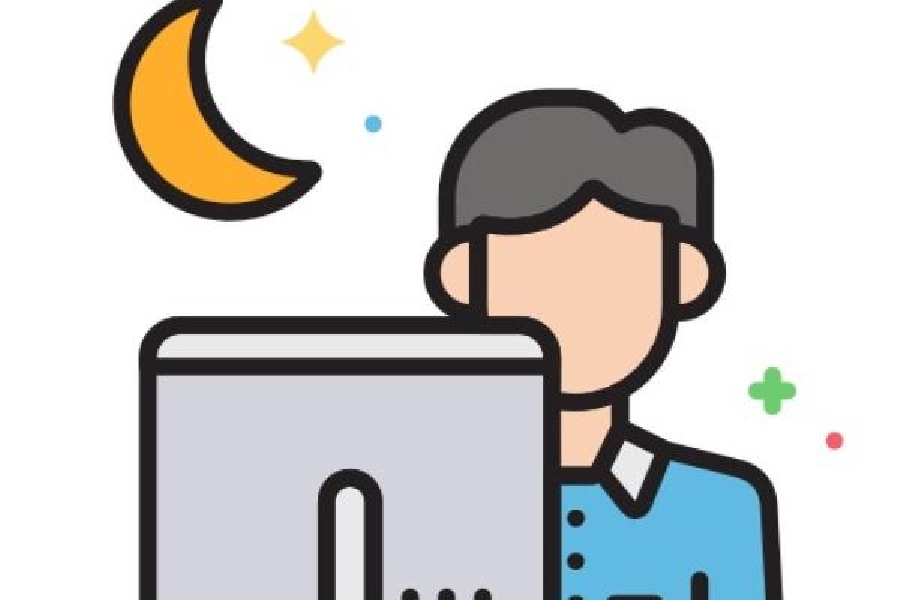Sleep is essential for optimal health. Glamourising overwork and compromising sleep is applauded by many people. In the pursuit of professional excellence, people tend to overwork. Hard work is encouraged but overwork may be detrimental to health. Working too hard at office compromising on nutrition and sleep is harmful.
There is no doubt that college students today face fierce competition to choose careers they desire. Even in professions like police, medicine or journalism, many tend to overwork and sacrifice sleep. Most consider achieving wealth and fame as the final sign of success, though maintaining adequate health is no less important.
Addiction to social media till late at night or bringing home office work does cause sleep disturbance. Regular intake of alcohol or coffee late at night can also compromise sleep.
Usually, adults need at least seven or eight hours of sleep daily. Younger individuals require more sleep. Compromising on sleep is associated with negative health outcomes. Sleep should not be considered as a waste of time and must receive the same importance as proper nutrition and exercise for maintaining health.
Sleep deprivation
Sleep deprivation is a public health challenge all over the world. Various medical issues, including mental health problems, have been reported because of sleep deprivation.
Insomnia and sleep deprivation are not same. Insomnia is the inability to sleep in spite of trying. Sleep deprivation is the inability to get enough time to sleep.
Overwork and sleep deprivation are associated with various symptoms which may go unrecognised. They are:
- Daytime sleepiness
- Fatigue and forgetfulness
- Increased irritability
- Lack of focus and impaired judgement
- Loss of motivation
- Changes in mood
Sleep should follow the circadian rhythm, which regulates the physical, mental and behavioural changes in a 24-hour cycle. Chronobiology is the study of circadian
rhythm.
Sleep is usually recommended at night. However, changes are necessary for those having night shifts or other professional commitments.
There are various stages of sleep starting from light sleep to deep sleep. During REM or rapid eye movement cycle of sleep, people tend to dream.
A landmark study was conducted in a southern state on sleep deprivation among schoolchildren aged between 13 and 18 years.
Around 76 per cent of children were suffering from sleep deprivation. This resulted in poor academic performance. Involving parents and inclusion of good sleep habits in the school curriculum was recommended.
Medical problems
Inadequate sleep may lead to deterioration in performance. Such issues are ignored by the family. Medical consultation is recommended as it may have far reaching consequences. If the problem is due to deviated nasal septum or is diagnosed as obstructive sleep apnoea, it can be surgically corrected by a specialist
ENT surgeon.
Hard work is encouraged to achieve success in every field, but not at the cost of sleep. The problem must be detected in time and addressed appropriately.
There are various stages of sleep deprivation which need to be recognised. Initially, the symptoms are mild.
Gradually, the symptoms intensify, and the person has trouble in focusing. There are phases of brief mental lapses or micro-sleep episodes. Finally, the person struggles to communicate and has hallucinations.
Association with various diseases have been reported due to sleep deprivation. There are short and long-term effects. They are:
- Hypertension and changes in lipid profile
- Cerebrovascular events like stroke
- Obesity and type 2 diabetes
- Decrease in immunity
- Depression and anxiety
- Loss of memory and increase in Alzheimer’s disease
Management of anxiety causing sleep disturbance must be addressed adequately. In most cases, counselling and specific medications are helpful.
Burnout
Professional burnout is related to chronic work stress and inadequate sleep. Though not recognised as a disease, burnout is considered as an occupational phenomenon. There are no standardised criteria to diagnose this condition.
Unfortunately, many people celebrate burnout as a badge of honour. Many professionals overwork fearing they will be left behind and daily sleep is sacrificed. There are many instances where young achievers are very successful initially but fail to sustain it.
Early burnout has been reported in many demanding professions and sometimes even loss of life. As long as money, status and achievement are glamourised, there will always be people to overwork and achieve it.
The Maslach Burnout Inventory or MBI is a questionnaire to measure burnout. It usually assesses three dimensions of personality:
- Emotional exhaustion and fatigue
- Depersonalisation — a negative or detached response to situations
- Reduction in personal accomplishments and feeling less competent.
Once a popular message from Wall Street read that “money never sleeps and transactions can be done all the time”. Although many are desperate to achieve quick monetary success, maintaining balance between work, stress and sleep is crucial.
Sometimes management techniques and counselling are more important than medical treatment.
Sleep well to stay healthy.






